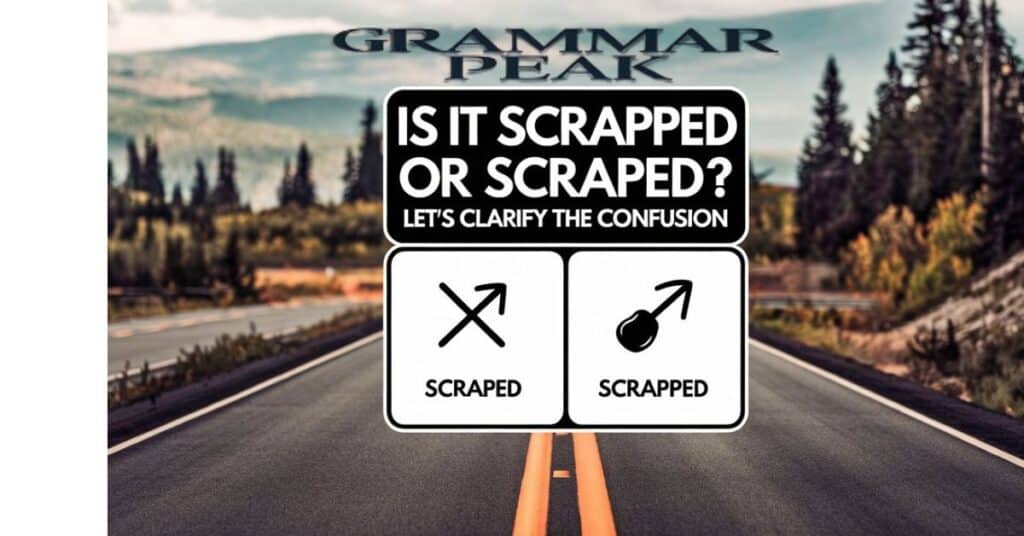Understanding the difference between scrapped and scraped can be challenging. Many people use these words interchangeably, but they have distinct meanings. In this article titled “Is it Scrapped or Scraped? Let’s Clarify the Confusion,” we will explore the definitions, uses, and origins of both terms.
You’ll learn about the difference between scrapped and scraped, including examples and synonyms. By the end, you will clearly understand how to use scrapped and scraped correctly. This knowledge will enhance your communication clarity and help avoid common mistakes. Let’s dive into the details and unravel this linguistic confusion together!
Why is There Confusion?
The words scrapped and scraped are heterotrophs. This means they sound alike but are spelled differently and have different meanings. The similarity in sound often leads to mistakes in writing and speaking.
Many people don’t realize that these words belong to different contexts. For example, you might hear someone say, “The project was scrapped,” when they meant to say, “The data was scraped.” This confusion can lead to communication clarity issues.
Both words are past tense verbs, but they describe different actions. Scrapped refers to something that has been discarded or eliminated. In contrast, scraped refers to a physical action, like rubbing or dragging a surface. Understanding the context helps clarify their meanings.
You might be Is it Scrapped or Scraped? Let’s Clarify the Confusion
What Does the Word “Scrapped” Mean?
The word scrapped means to discard, abandon, or eliminate something. When you scrap a plan, project, or idea, you decide not to continue with it. For instance, if a company realizes that a project is not viable, they may scrap it altogether.
This decision often comes after careful consideration. In many cases, scrapping implies a sense of finality. Once a decision is made, the scrapped item is rarely revisited. For example, a canceled product launch might be described as scrapped if it is not going to happen at all. This term is commonly used in business, engineering, and project management.
| Word | Definition | |
| 1 | Scrapped | The term scrapped generally means to discard, eliminate, or remove something. It can be used in various contexts, such as: |
| – Industrial: Referring to the disposal of waste material or old, non-functioning equipment. | ||
| – Project Management/Business: Cancelling a project or plan that is no longer deemed feasible or beneficial. | ||
| – Technology: Removing certain features or elements during software or product development. | ||
| – General Usage: Throwing away, ditching, or abandoning something. |
Explore These Is it Scrapped or Scraped? Let’s Clarify the Confusion
What Does the Word “Scraped” Mean?
On the other hand, scraped refers to the act of removing material from a surface. It involves a physical action, such as cleaning or smoothing. For example, if you scrape paint off a wall, you are physically removing it. This term can also be used in a figurative sense.
For instance, a person might say they “scraped together” enough money for a vacation, meaning they gathered it from various sources. Scraped is often associated with actions that involve friction or abrasion. It is important to note that the word can describe both literal and metaphorical actions
| Word | Definition | |
| 1 | Scraped | The term scraped refers to the action of removing material from a surface by rubbing or using a sharp object. It can imply: |
| – Physical Removal: Cleaning or smoothing a surface by removing dirt, paint, or other materials. | ||
| – Data Extraction: In technology, it refers to the process of extracting information from websites or databases. | ||
| – General Usage: It can also mean to gather or collect information or resources carefully. |
“Scrapped” vs “Scraped”: Differences
The key differences between scrapped and scraped lie in their meanings and contexts. Scrapped refers to something that has been discarded, while scraped deals with the action of removing something from a surface.
Here’s a simple comparison table to illustrate these differences:
| Aspect | Scrapped | Scraped |
| Meaning | Discarded or eliminated | Physically removed material |
| Context | Ideas, plans, projects | Surfaces, cleaning actions |
| Example | The project was scrapped. | She scraped the dirt off the table. |
| Usage | Business, engineering | Cleaning, data collection |
Understanding these differences can help avoid the common scrapped and scraped confusion in communication.
Which One Should You Use: “Scrapped” or “Scraped”?
“scrapped”
The term “scrapped” generally refers to something that has been discarded, abandoned, or no longer in use. It is commonly used in various contexts, such as in manufacturing, where materials or products that are not up to standard are scrapped.
In contrast, if you’re considering “scraped,” this term typically refers to the act of removing something from a surface, often using a tool. For example, scraping paint off a wall or scraping data from a website involves pulling or lifting something away.
“Scraped”
The term “scraped” primarily refers to the action of removing or extracting something from a surface. This can involve using a tool or implement to physically scrape off materials, such as paint or dirt. In a digital context, scraping often pertains to the extraction of data from websites, where automated tools or scripts collect information for various purposes like analysis or aggregation.
When deciding on the use of “scraped,” it’s important to ensure that it fits the context appropriately. For instance, in discussions about data collection, “scraped” effectively conveys the method of data extraction. However, in physical contexts, such as cleaning or maintenance, “scraped” accurately describes the action taken to remove unwanted substances
Examples in Context
To truly understand how to use these words, let’s look at examples in context.
Here are 20 sentences that illustrate the use of scrapped
The first sections scrapped
- The team scrapped the entire marketing plan after the new research came in.
- Due to budget cuts, the company scrapped its expansion project.
- After much debate, they finally scrapped the old policy in favor of a new one.
- The prototype was scrapped because it failed to meet safety standards.
- We scrapped the outdated software and switched to a more efficient program.
- The chef scraped the burnt cheese off the pizza before serving it.
- She scraped the ice off her windshield every winter morning.
- The researcher scraped the data from multiple websites for his analysis.
- He scraped the mud off his shoes before stepping into the house.
- After the storm, they scraped the debris from the driveway.
2nd sections
- The designer scrapped the previous concept and started fresh with new ideas.
- They scrapped the event due to safety concerns amid the pandemic.
- She scraped the last bit of frosting from the bowl to enjoy every morsel.
- The committee scrapped the proposal after receiving negative feedback.
- He scraped the surface of the wood to prepare it for painting.
- The project was scrapped because it was no longer feasible.
- After reviewing the budget, they scrapped several planned initiatives.
- The artist scraped layers of paint off the canvas to reveal the original image.
- The government scrapped the outdated regulations to streamline the process.
- Before moving in, they scraped the old wallpaper off the walls.
Examples of Scraped
Here are 20 sentences using scraped
The first sections scraped
- The archaeologist carefully scraped the dust away from the ancient artifact.
- He scraped his knee when he fell off his bike.
- Every morning, she scraped frost off her car’s windshield.
- The baker scraped the remaining dough from the bowl.
- He scraped his boots on the doormat before entering the house.
- She scraped the burnt toast before eating it.
- The data analyst scraped information from different websites for his research.
- He scraped the old paint off the wall before repainting it.
- She scraped the mud off her shoes after the hike.
- The dentist scraped the plaque off her patient’s teeth.
2nd sections
- The chef scraped the leftover food into the compost bin.
- The gardener scraped the soil to plant new seeds.
- He scraped the ice off the sidewalk to prevent people from slipping.
- The mechanic scraped the rust off the old car part.
- The artist scraped a layer of paint off the canvas to reveal a hidden image.
- She scraped the residue off the pan after cooking dinner.
- The worker scraped the chewing gum off the underside of the table.
- He scraped the barnacles off the bottom of the boat.
- The window cleaner scraped off the grime from the glass.
- She scraped the sticker off the new appliance.
Synonyms and Similar Terms to “Scrapped” and “Scraped”
Synonyms of “Scrapped
Here are some synonyms for “Scrapped”
- Discarded: Thrown away as no longer useful or necessary.
- Abandoned: Given up completely; left without continued support.
- Canceled: Decided or announced that a planned event will not take place.
- Eliminated: Completely removed or gotten rid of.
- Jettisoned: Thrown or dropped from a ship or aircraft.
- Terminated: Brought to an end.
- Discontinued: Stopped making or doing something.
- Rejected: Dismissed as inadequate, inappropriate, or not to one’s taste.
- Disposed of: Got rid of by throwing away or giving or selling to someone else.
Synonyms of “Scraped”
Here are some synonyms for scraped:
- Removed: Taken away from a surface or situation.
- Cleaned: Made free of dirt or unwanted material.
- Rubbed: Moved back and forth across a surface to remove something.
- Sanded: Smoothed a surface by rubbing it with sandpaper.
- Abrasive: Used to describe a rough material that can wear away surfaces.
- Scratched: Made a mark or wound on a surface by scraping.
- Gleaned: Gathered information or material gradually or carefully.
- Pealed: Removed a layer, often used in the context of fruit skins.
- Scoured: Cleaned or removed dirt by rubbing vigorously.
- Shaved: Removed a thin layer from a surface, often with a blade.
Origins of “Scrapped” and “Scraped”
Origins of “Scrapped”
The term scrapped finds its roots in Old Norse. It originates from the word “scrap,” which translates to “scraps, trifles, or fragments.” Over time, the term evolved and came to be associated with the act of discarding or eliminating something, especially in an industrial context like scrapping a car or a ship.
The usage further expanded to include the metaphorical scrapping of plans, ideas, projects, and more. In the 19th century, “scrap” was used in English to refer to small pieces or bits of anything, particularly leftover food.
Origins of “Scraped”
The term scraped has its origins in the Old English word “scraped,” which means “to scraped or scratch. This word is related to similar words in other Germanic languages, such as the Old Norse “scraped” and the Dutch “sharp
These early forms all convey the idea of removing material from a surface through a sharp or abrasive tool. As the language evolved, scrape began to take on broader meanings beyond just the physical act of removing material.
FAQ” S
What is the difference between scrapped and scraped?
Scrapped means discarded, while scraped refers to physically removing material.
Can scrapped be used for projects?
Yes, when a project is canceled, it is often referred to as scrapped.
What are some synonyms for scrapped.?
Synonyms include discarded, abandoned, and eliminated.
How can I use scraped in a sentence?
You can say, “She scraped the dirt off the table.”
What is the origin of the word scrapped?
The word scrapped comes from the Old Norse word meaning “to scrape.”
Conclusion
knowing the difference between scrapped and scraped is important for clear communication. Scrapped refers to something that has been discarded or eliminated, while scraped involves physical removal. By understanding their meanings, uses, and contexts, you can avoid confusion. Remember these key points when writing or speaking. This will improve your language skills and ensure that your message is understood correctly.

Mason Blake is an experienced blogger with a passion for language and communication. With years of expertise in crafting informative and engaging content, Mason shares valuable insights on grammar and writing. His clear, concise, and reader-friendly approach has earned him a loyal following, helping readers sharpen their language skills and master the art of effective communication.







